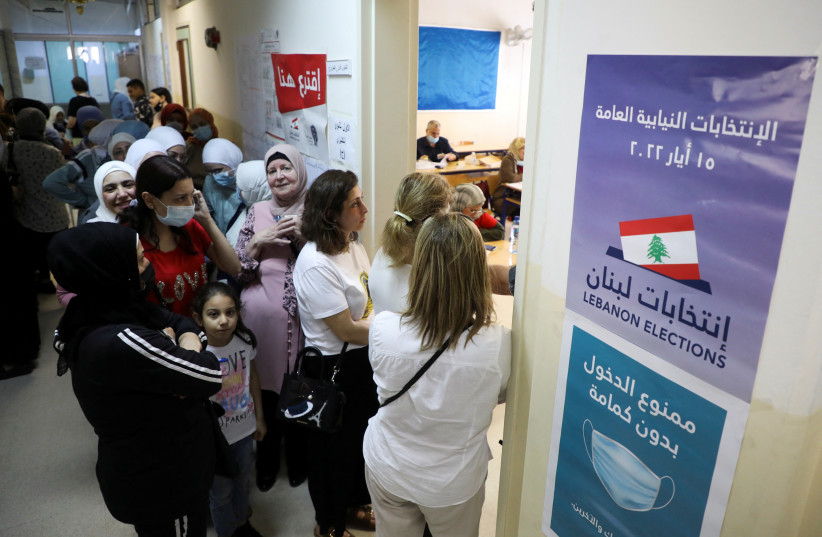Hezbollah and its allies lost the majority it held in the Lebanese parliament, as their opponent, the Christian Lebanese Forces, became the largest Christian party in parliament after the final results of the elections in the country were announced on Tuesday.
The election process was marred by violence, violations of election regulations and power outages, with only about 41% of voters casting their vote.
Supporters of Hezbollah and the Christian Lebanese Forces clashed and polling monitors were threatened as Lebanese citizens voted in the first parliamentary elections since the economic crisis in the country began.
Monitors from the Lebanese Association for Democratic Elections (LADE) reported that its monitors were threatened by members of Hezbollah and its ally the Amal Movement multiple times at multiple polling locations on Sunday.
Politicians will now need to work to form a government and resume efforts to remedy Lebanon's worsening economic crisis.

Following are the results of the elections by party, according to L'Orient Le Jour:
- Lebanese Forces: 19 seats
- Free Patriotic Movement (Hezbollah ally): 17 seats
- Amal (Hezbollah ally): 14 seats
- Related to the Future Movement: 8 seats
- Hezbollah: 13 seats
- Kataeb: 4 seats
- Marada (Hezbollah ally): 2 seats
- Progressive Socialist Party: 8 seats
- Opposition Groups formed after economic protests: 13 seats
- Independents: 16 seats
- Linked to March 8 alliance (Hezbollah allies): 9 seats
- Linked to March 14 alliance: 2 seats
- Tashnag (Hezbollah ally): 3 seats
Hezbollah warns against civil war
On Monday, Hezbollah MP Mohammed Raad warned other parties to "pay attention to their political discourse and behavior, and to the country's future" and urged them not to be "fuel for a civil war," according to Al-Mayadeen.
Raad additionally warned that the other parties would "lead Lebanon into the abyss" if they refused to form a national unity government. Addressing Hezbollah's opponents, he added that "we accept you as our opponents in Parliament, but we will not accept you as shields for Israel and those behind it."
Hezbollah and its allies won a majority of 71 when Lebanon last voted in 2018.
On Monday night, supporters of Hezbollah burned a sculpture of a fist that had been set up by anti-government protesters in Martyrs' Square in Beirut while chanting "Shia, Shia" and waving Hezbollah flags. The sculpture has been torched in the past.
Hezbollah and Lebanese Forces are staunch opponents. In October, deadly clashes broke out between Hezbollah supporters and Christians in the Tayouneh area of Beirut where it meets Ain El Remmaneh and Chiyah, a site famous for sectarian clashes between Shi'ites, Sunnis and Christians during the 1975 civil war in Lebanon, as it marked the border between east and west Beirut.
Hezbollah has accused the Lebanese Forces of ambushing protesters and sparking the clashes, while the Lebanese Forces has rejected the claims, saying Hezbollah incited the shooting by entering the sensitive area.
Hezbollah Secretary-General Hassan Nasrallah is set to give a speech on Friday afternoon.
Country in crisis
Lebanese leaders will need to work to form a government as the country suffers from a worsening economic and financial crisis. A United Nations report published last week stated that "the destruction of the national currency, exorbitant price increases and the collapse of the banking sector have led to the generalized impoverishment of the population amid sectarian political stasis."
UN Special Rapporteur on extreme poverty and human rights, Olivier De Schutter, warned that Lebanon is a "failing state" with an estimated four in every five people in poverty.
De Schutter stressed that “Political leadership is completely out of touch with reality, including with the desperation they’ve created by destroying people’s lives. Lebanon is also one of the most unequal countries in the world, yet leadership seems unaware of this at best, and comfortable with it at worst.”
“If [the] trust for a better future is to be restored, the Government must strengthen the Central Inspection, free the National Anti-Corruption Commission from potential political interference, ensure independent oversight of Électricité du Liban, and ingrain accountability and transparency into the recovery plan," said the UN special rapporteur.
